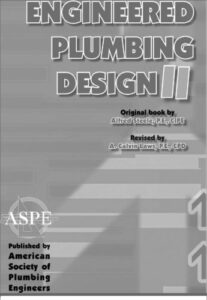ASPE Engineering Plumbing Design 2
ASPE Engineering Plumbing Design 2
Engineering Plumbing Design is a unique book in that the mix between hands-on practical information and the scientific underpinnings of plumbing design is perfectly matched for the designer’s needs. In contrast, many books have been published on plumbing that are filled with numerous illustrations of tools, fittings, tables, etc., which do little to assist in the design of engineered plumbing systems and, in particular, they leave out the scientific basis needed to make sound decisions in designing plumbing systems.
You can also read National Standard Plumbing Code Illustrated 2015
ASPE-Engineering Plumbing Design 2 Content
- Systems and Fixtures
![Engineering Plumbing Design]()
- Fixture Traps
- Flow in Horizontal Drainage Piping
- Soil and Waste Stacks
- Drainage Systems
- Drainage System Sizing
- Storm Water Systems
- Vent Systems
- Vent Sizing
- Sumps and Ejectors
- Flow in Water Piping
- Velocity Effects in Piping
- Water System Design
- The Water System Sizing
- Water System Components
- Hot Water System Design
- Sizing the Hot Water Circulating System
- Pipe Expansion and Contraction
- Water Piping Tests
- Chilled Drinking Water Systems
- Private Sewage Disposal Systems
- Valves
ASPE-Engineering Plumbing Design 2 Product details
- Hardcover : 380 pages
- Publisher: American Society of Plumbing Engineers; Second Edition edition (2004)
- ISBN-10: 1891255207
- ISBN-13: 978-1891255205
- Product Dimensions: 9.2 x 1 x 6.2 inches
- Shipping Weight: 1.6 pounds
The American Society of Plumbing Engineers defines plumbing systems as all potable water supply and distribution pipes, plumbing fixtures and traps, drainage and vent pipes, and building (house) drains, including their respective joints and connections, devices, receptacles, and appurtenances within the property lines of the premises and including potable water piping, potable water treating or using equipment, fuel gas piping, water heaters, and vents for same.
Plumbing engineers are responsible for systems that serve all types of buildings, including commercial, residential, and institutional buildings, such as hospitals, laboratories, industrial plants, jails, schools, shopping centers, housing developments, power plants, research centers, and sports complexes.


Comments are closed.